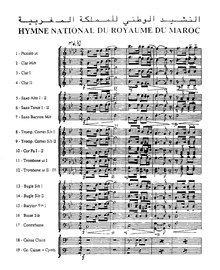Cherifian Anthem
| English: National Anthem of Morocco | |
|---|---|
| النشيد الوطني المغربي ⵉⵣⵍⵉ ⴰⵏⴰⵎⵓⵔ ⵏ ⵍⵎⵖⵔⵉⴱ | |
 | |
National anthem of Morocco | |
| Lyrics | Ali Squalli Houssaini, 1970 |
| Music | Léo Morgan, 1956 |
| Adopted | 1956 |
| Audio sample | |
U.S. Navy Band instrumental version | |
The Cherifian Anthem (Template:Lang-ar; Template:Lang-ber)[1][a] was first adopted in 1970 and is the anthem of Morocco. Composed by French military officer and chief of music for the royal Moroccan guard Léo Morgan, it has been in use since the French protectorate period. Lyrics were written for it by the Moroccan author and poet Professor Ali Squalli Houssaini and adopted in 1970.[2]
History
The anthem's melody was composed by Léo Morgan, a French military officer and chief of music for the royal Moroccan guard, during the French protectorate, The anthem was believed to have been composed in 1952, or four years before Morocco got back its independence from France and Spain.
After the Moroccan national football team qualified for the 1970 World Cup in Mexico for the first time, the idea to write lyrics for the anthem was proposed. Lyrics by writer Ali Squalli Houssaini were either chosen as part of a competition by King Hassan II, or by direct commission of the King to write the lyrics.[3]
Lyrics
| Arabic original[4][5] | Romanisation | IPA transcription[b] | English translation |
|---|---|---|---|
منبت الأحرار |
Manbita l-ʾaḥrār |
[mæn.bi.tˢæ‿l.ʔɑħ.rɑːr] |
Root of the free, |
| Berber translation (Tifinagh)[6] | Berber translation (Latin) | IPA transcription[6][c] |
|---|---|---|
ⴰⵙⴰⵖⵎⴰⵢ ⵏ ⵉⵎⴰⵣⵉⵖⵏ |
Asaɣmay n imaziɣn |
[æ.sæɣ.mi n‿ɪ.m(æ).zɪ.ɣən] |
Notes
- ^ officially the National Anthem of the Kingdom of Morocco (Template:Lang-ar; Template:Lang-ber).
- ^ See Help:IPA/Arabic and Moroccan Arabic § Phonology.
- ^ See Help:IPA/Berber and Central Atlas Tamazight § Phonology.
References
- ^ "Musique : Quand Léo Morgan a-t-il composé l'hymne national chérifien du Maroc ?". Eurêkoi (in French). 2021-10-11. Retrieved 2022-09-30.
- ^ "Dahir n° 1-05-99 relatif aux caractéristiques de l'emblème du Royaume et à l'hymne national" [Dahir n° 1-05-99 relating to the emblem of the Kingdom and the national anthem] (PDF). Bulletin Officiel du Royaume du Maroc (in French) (5378): 6–12. 2005-12-15.
- ^ Bazza, Tarek. "Ali Squalli, Author of Moroccan National Anthem Dies at 86". www.moroccoworldnews.com. Archived from the original on 2018-11-07. Retrieved 2021-12-11.
- ^ العزيز،, ابن عبد الجليل، عبد (2005). الأناشيد الوطنية المغربية ودورها في حركة التحرير (in Arabic). أكاديمية المملكة المغربية،. p. 98. ISBN 978-9981-46-036-2.
- ^ "Morocco – nationalanthems.info". Retrieved 2021-12-11.
- ^ a b AHMED BELAA (2020-09-22). "ⵉⵣⵍⵉ ⴰⵏⴰⵎⵓⵔ ⵙ ⵜⵎⴰⵣⵉⵖⵜ النشيد الوطني المغربي بالأمازيغية". YouTube. Archived from the original on 2022-05-07. Retrieved 2022-05-07.
{{cite web}}: CS1 maint: bot: original URL status unknown (link)
